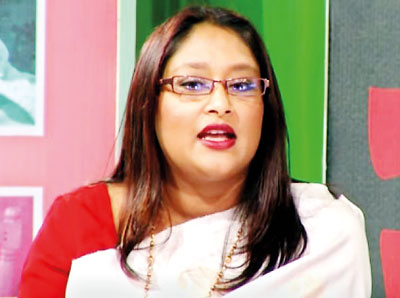Thursday Feb 26, 2026
Thursday Feb 26, 2026
Tuesday, 11 July 2017 00:00 - - {{hitsCtrl.values.hits}}
Saima Wazed Hossain, a globally-renowned champion for the cause of autism spectrum disorder, has been appointed as WHO Goodwill Ambassador for Autism in South-East Asia Region.
“Hossain’s passionate and persistent efforts for addressing autism are commendable. She has been making significant contributions towards creating awareness and generating action to address and elevate sufferings of people affected by autism,” Dr. Poonam Khetrapal Singh, Regional Director for WHO South-East Asia, said, announcing extension of Hossain’s association with WHO, now as a Goodwill Ambassador for a two-year period.
In the last one year, championing for the cause of autism for WHO, Hossain facilitated the ‘Thimphu Declaration’ on autism and other neurodevelopmental disorders at an international conference in Bhutan in April 2017. The declaration calls for a whole-of–society and whole-of-government approach, with a focus on strengthening national capacities in health, education and social care sectors to provide effective services and support to people with autism and other neurodevelopmental disorders.
As WHO Goodwill Ambassador, Hossain will be promoting the Thimphu declaration which also emphasises on integrating the needs of autism affected people, into national health and socioeconomic development plans, Dr. Singh said.
Besides the Thimphu declaration, as a WHO champion for autism in the Region, Hossain made other important contributions, such as development of a collaborative framework for implementation of WHO Regional Strategy on autism spectrum disorder; and national action plans for post disaster mental health and psycho-social support, the Regional Director said.
Autism and other neurodevelopmental disorders are life-long disabilities that affect brain functioning, and when left without proper support can cause significant impairment in exercising of an individual’s human rights and fundamental freedoms.
Globally, autism prevalence rates are estimated to be 160 cases in a population of 10 000. In low-and middle-income countries, children with autism do not get the medical attention and care they need. Their life is a struggle, marred by stigma and discrimination.
“With Hossain’s efforts and support, WHO aims to put autism high on the health agenda of countries in the Region, to address this public health challenge,” Dr. Singh said.
Earlier, in recognition of Hossain’s work for advancing autism in her home country Bangladesh, the WHO South-East Asia Regional Office had honoured her with the Excellence in Public Health Award in September 2014.
She was designated as WHO Regional Champion for Autism in May 2016.